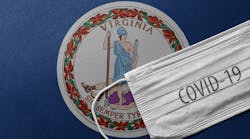Regulatory Update: Virginia Is Undoing COVID Workplace Rules
With worried state and local elected officials pulling back on COVID-19 restrictions across the country, it should not seem too surprising that the state of Virginia is getting ready to withdraw its pandemic-related employee health and safety requirements that earlier served as an example for other states to follow.
When this change takes place, it should represent a symbolic landmark in regard to changing attitudes about dealing with the pandemic. But because the Virginia political landscape has changed significantly this year, don’t expect other states like California to follow suit—at least not any time soon.
On Feb. 16, the Virginia Department of Labor and Industry (DOLI) Safety and Health Codes Board (HCB) voted to recommend revoking the Commonwealth’s COVID-19 permanent workplace safety standard.
This action comes after the state’s newly-elected Governor Glenn Youngkin (R) issued an executive order directing the board to convene an emergency meeting where they considered whether a sufficient need continues to exist to maintain Virginia’s permanent workplace safety standard.
The HCB had adopted the requirement as a temporary standard in 2020 under the direct order of then-governor Ralph Northam, who is a Democrat. Virginia Democrats lost control of the governorship in a November 2021 election, which saw Republicans sweep the top three elected positions in the state and regain control of the House of Delegates.
The COVID temporary standard for workplaces survived a legal challenge that was brought to court by business groups and later it was made permanent in January 2021.
In February 2022, after holding a meeting at Youngkin’s direction, the board adopted DOLI’s recommendation, which held that there is no continuing need for the permanent standard because the virus “based on emerging scientific and medical evidence no longer constitutes a grave danger to employees in the workplace.”
According to attorneys for the law firm of Epstein Becker & Green, the next step will be for the board to send its findings to the governor and then issue a 30-day notice and comment period seeking public input about revoking the standard. In addition, the HCB is required to hold a public hearing before it takes a final vote on revocation.
Other States May Follow
If the permanent standard is repealed—which seems likely at this point—employers would no longer have to require masking indoors, enforce social distancing, maintain ventilation systems, report COVID-19 cases to the Virginia Department of Health or provide COVID-19 training to employees, among other current requirements, the attorneys point out.
In the meantime, while the process unspools, they recommend that employers continue to maintain their existing COVID-19 safety measures because they are still required under the permanent standard.
In the past, the Virginia board attempted to align the permanent standard with Centers for Disease Control and Prevention (CDC) guidance issued in August 2021, but given the evolving nature of the CDC’s guidances, inconsistencies continued to persist, note attorneys Betty Graumlich, Noah Oberlander and Carew Bartley of the Reed Smith law firm.
The CDC revised its guidance again recently, dialing back face mask policies recommended for employers and businesses who deal with the public. Those changes also will impact how officials at the Occupational Safety and Health Administration (OSHA) choose to enforce COVID safety measures taken by employers.
Once the state’s permanent standard is rescinded, the Virginia Occupational Safety and Health Program will still have workplace safety enforcement authority under its General Duty Clause as informed by applicable federal and state public health guidance. “Virginia employers should be aware of these forthcoming changes to determine how their operations may be impacted,” the Reed Smith attorney stress.
At present, 14 states have adopted COVID workplace rules, including Washington State and Oregon, which also created their own ETS standards. Some states simply chose to issue workplace masking requirements while others imposed some sort of safety official guidelines for employers to follow. Several of those may be withdrawn as political leaders make changes in attempts to avoid voter backlash at the polls this fall.
In California, one of the first states to follow Virginia’s example in announcing an ETS, employers are not likely to see any major changes in that state’s COVID rules for businesses. That state issued its ETS not long after Virginia announced its standards, and later made them permanent in 2021.
With a political landscape significantly different from that of Virginia, California employers are unlikely to see a switch to Republican leadership any time in the near future. The wave of federal and state COVID regulations issued over the past two years as emergency standards were pushed by labor unions and were granted by Democrat leaders dependent on union support.
Under President Biden’s direction, federal OSHA adopted safety standards in 2021 for employers that ended up being limited to the healthcare industry. A few months later, the agency issued an ETS requiring employers to ensure their employees were vaccinated against COVID. The U.S. Supreme Court struck down that particular standard as unconstitutional earlier this year.
At present, the federal agency is swimming against the tide of nationwide rollbacks and is attempting to resurrect some of these requirements by engaging in a permanent rulemaking process, which federal officials believe would survive future court review.

